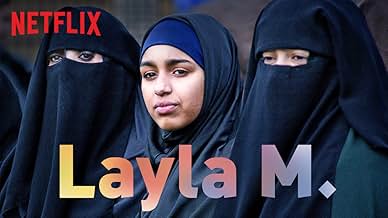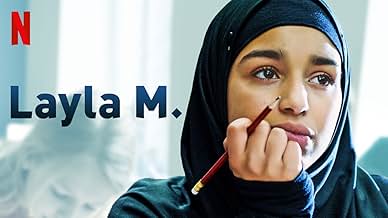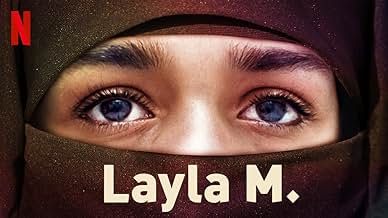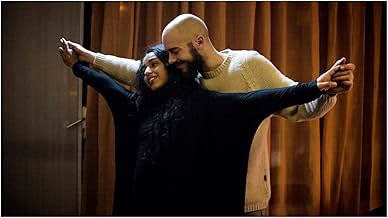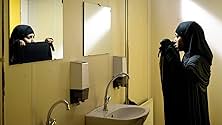IMDb-BEWERTUNG
6,6/10
2110
IHRE BEWERTUNG
Der Film zeigt die zunehmende Radikalisierung einer jungen Muslimin, die in Amsterdam aufwächst.Der Film zeigt die zunehmende Radikalisierung einer jungen Muslimin, die in Amsterdam aufwächst.Der Film zeigt die zunehmende Radikalisierung einer jungen Muslimin, die in Amsterdam aufwächst.
- Regie
- Drehbuch
- Hauptbesetzung
- Auszeichnungen
- 6 Gewinne & 8 Nominierungen insgesamt
Suhaib Nashwan
- Abu Osama
- (as Suhaib Neshwan)
Empfohlene Bewertungen
Layla was nowhere wrong. She is a good muslim. She just wanted her rights. Right to hijaab, right to be equal, right to freedom of religion and a lot more. And when she felt she's not gonna live freely there. She choose to leave her family and marry her friend. It's not her fault whatever next happened. Why we are repeating these stories again and again. What if the director shows that the guy was a good Muslim and they lived their lives peacefully together and fought for their rights. But no, we are gonna show this islamophobia again n again.
At a time of the ISIS raucous war in the Middle East, a Muslim teen with a strong identity falls prey to Jiddahists, trading her confortable life in a working decent family in The Netherlands for an unknown future. Strong character but naive beliefs do the rest. Modest production, conveys the idea and tells a lesson
No time is wasted in establishing that our title character knows where she stands politically. It is easy to feel sorry for her situation and empathize how one can be seduced by the rhetoric of radicals when you are helpless against law enforcement, stupid people and your own parents.
She never seems like more than a child as she dives into the world political activism only to find reality does not always meet expectation.
The breezy efficient tone make this palatable that isn't a comedy but know how to time itself. A TV series of this story would just feel like a chore.
A simple cycle of inspiration and disillusionment within earshot of a more complicated world but this is definitely about the personal journey and how our politics is often more about reacting to ourselves than to the world.
My favorite scene is Layla playing soccer with the children.
If you are fascinated by the process of how people in the developed world are jihadized then you'll be disappointed but this was definitely made with an agenda and that was to humanize, without apologism, a certain kind of person who we are punishing greatly for understandable errors.
She never seems like more than a child as she dives into the world political activism only to find reality does not always meet expectation.
The breezy efficient tone make this palatable that isn't a comedy but know how to time itself. A TV series of this story would just feel like a chore.
A simple cycle of inspiration and disillusionment within earshot of a more complicated world but this is definitely about the personal journey and how our politics is often more about reacting to ourselves than to the world.
My favorite scene is Layla playing soccer with the children.
If you are fascinated by the process of how people in the developed world are jihadized then you'll be disappointed but this was definitely made with an agenda and that was to humanize, without apologism, a certain kind of person who we are punishing greatly for understandable errors.
We should also be talking about how the girl was made into feel that she's doing something wrong, that's why she chose Islam. Kids dying, people being treated as lower than humans... This girl wanted to find a place of belonging, and spread peace, love and help to everyone. But to more she ached, to more people were against her, which caused her to be more violent and assertive. Why should there be a "You & Us" anyway? This is what the terrorists are doing, but we failed at making them know that it doesn't have to be like that.
After so many TV reports about youth radicalisation in European countries I thought I could figure out the whole narrative of "Layla M": a rebellious teenager of North-African background wearing the black veil as a marker of reset identity, marrying another extremist and exiling herself to Syria, like so many European "second-generations" her age in the early 2010s... among a few 'occidental' coverts spotting red bushy beards or azure eyes emerging from their chadors.
Having also watched documentaries on the daily life in Raqqa, I felt it a Karma retribution to those who put themselves in the lion's mouth, in a lifestyle they didn't expect. Some tried to come back, pleading redemption and brandishing their citizenship but wasn't the exile a renouncement to it in the first place? As imperfect as they were, the countries or values they rejected provided them education, welfare and to some degrees the very right to speak their identity.
Being of a similar background myself, I can relate to these existential questionings, I had no hesitation changing my first name once I got my citizenship, feeling that an ethnic name would be too much a burden. It was just as if I had that 'stranger complex' myself. While I am not a religious person, I had my 'religious periods' never too extreme but sometimes, a stranger find comfort to their individual frustration in a collective sameness.
Still, why did I finally watch "Layla M"? After binging the series "Kalifat', I was wondering whether the film would provide other insights. Well, it did. It couldn't avoid the aforementioned plot points but I just loved the character's arc of Layla. If anything, Mijke de Jong's film is a character study and a damn good one, starting with predictable elements to better subvert them at the end, revealing that the human factor is decisive in the religious choices but also works like a double-edged sword... remember that Oscar Wilde's quote about the two tragedies in one's life?
Layla, magnificently played by Dutch actress Nora Koussour was a very interesting character indeed, one that makes such an effort to be disagreeable (with her friends, her family, any 'white person'...) that it's remotely impossible to like her. Then slowly we start to understand her without sympathizing, not because we change our perspective, but because she changes hers. This is the tale of a woman who lived her religious, dream to the fullest, playing the virtue- signaling outcast, the dissident voice whenever she could, parroting the Texts in form of sly retorts... only she forgot an important verse: "perhaps you hate a thing that is good for you; or you love a thing that is bad for you."
Speaking of hate, It's fair to call her hateful at first, interpreting everything as racism or i slamophobia and the most mundane events reinforce her conviction that muslims are natural outcasts in Western countries. She wears the veil at school, defies her own parents who are not religious and even tries to brainwash her younger brother. More seriously, she belongs to a local pro-Palestin activist organization and volunteer for anti-niqab pictures. Layla incarnates a lost generation, rebels with a dangerous cause, spoon-fed by extremist websites and social networks, fantasizing on a new life painted in holy colors.
She ultimately crosses the line when she exits the graduation exam room and tells a friend that she'll go to hell because she doesn't obey God by following his guideline . After one football game interrupted by an anti-terrorist brigade, Bilal gets arrested and at his return, seems to have been cured all right. At the police station, Layla is advised by a female officer to never come back, Layla asks her if she's muslim, the woman nods, Layla scoffs at her. There's something so pathetic in Layla's own stubbornness that our sympathy comes to an end, and had she kept with the same attitude, I might have disliked the film.
Then something interesting happens, determined to leave the family, she marries one of the boys from the organization, Abdel (Illias Addab) and after that, finally relieved of the burden to live among 'kufar', she finally smiles and her soul blossoms. There's a magical scene, when they're together in a hotel for their honeymoon, she plays a romantic hit song (music is supposed to be prohibited) and engages in a sensual belly dance, luring him into making love. And we can finally see her without her veil, erotic, sensual, feminine, in fact, finally acting as normally as any woman with the man she loves. After that, it's another "Layla M" illuminating the screen.
It seems that religion was just a veil she could hide her rebellious ego into and live on her own terms. However, when they go to Syria and she finds herself in a little place where men are told to dominate their women, she discovers that she's too 'occidental' for that, even more than her neighbor (a European woman) and she just can't stand the old fashioned way, like Bergman in "Stromboli" or Sally Field in "Not Without My Daughter". She's a fish out of the water even more since she discovered the delights of life. Tactfully, Abbad doesn't portray Abdel as an abusive husband, he's obviously caught in a vice between his 'job' and his defying wife, both conflicting with his rather pacifist nature.
The film is well shot, documentary style, the 'Syrian' background doesn't fool someone who grew up in Morocco but the character study is on-point: Layla was simply a brat rebelling through an archaic revision of religion until it becomes the norm, then she makes a 180 turn to find herself facing personal contradictions and deeper existential questionings. The tragic strength of ISIS is to spot young troubled minds at the pinacle of their existential crisis like symbolic clay pigeons.
Layla ultimately fell on the ground of reality but the final shot asks that haunting question: is she broken yet?
Having also watched documentaries on the daily life in Raqqa, I felt it a Karma retribution to those who put themselves in the lion's mouth, in a lifestyle they didn't expect. Some tried to come back, pleading redemption and brandishing their citizenship but wasn't the exile a renouncement to it in the first place? As imperfect as they were, the countries or values they rejected provided them education, welfare and to some degrees the very right to speak their identity.
Being of a similar background myself, I can relate to these existential questionings, I had no hesitation changing my first name once I got my citizenship, feeling that an ethnic name would be too much a burden. It was just as if I had that 'stranger complex' myself. While I am not a religious person, I had my 'religious periods' never too extreme but sometimes, a stranger find comfort to their individual frustration in a collective sameness.
Still, why did I finally watch "Layla M"? After binging the series "Kalifat', I was wondering whether the film would provide other insights. Well, it did. It couldn't avoid the aforementioned plot points but I just loved the character's arc of Layla. If anything, Mijke de Jong's film is a character study and a damn good one, starting with predictable elements to better subvert them at the end, revealing that the human factor is decisive in the religious choices but also works like a double-edged sword... remember that Oscar Wilde's quote about the two tragedies in one's life?
Layla, magnificently played by Dutch actress Nora Koussour was a very interesting character indeed, one that makes such an effort to be disagreeable (with her friends, her family, any 'white person'...) that it's remotely impossible to like her. Then slowly we start to understand her without sympathizing, not because we change our perspective, but because she changes hers. This is the tale of a woman who lived her religious, dream to the fullest, playing the virtue- signaling outcast, the dissident voice whenever she could, parroting the Texts in form of sly retorts... only she forgot an important verse: "perhaps you hate a thing that is good for you; or you love a thing that is bad for you."
Speaking of hate, It's fair to call her hateful at first, interpreting everything as racism or i slamophobia and the most mundane events reinforce her conviction that muslims are natural outcasts in Western countries. She wears the veil at school, defies her own parents who are not religious and even tries to brainwash her younger brother. More seriously, she belongs to a local pro-Palestin activist organization and volunteer for anti-niqab pictures. Layla incarnates a lost generation, rebels with a dangerous cause, spoon-fed by extremist websites and social networks, fantasizing on a new life painted in holy colors.
She ultimately crosses the line when she exits the graduation exam room and tells a friend that she'll go to hell because she doesn't obey God by following his guideline . After one football game interrupted by an anti-terrorist brigade, Bilal gets arrested and at his return, seems to have been cured all right. At the police station, Layla is advised by a female officer to never come back, Layla asks her if she's muslim, the woman nods, Layla scoffs at her. There's something so pathetic in Layla's own stubbornness that our sympathy comes to an end, and had she kept with the same attitude, I might have disliked the film.
Then something interesting happens, determined to leave the family, she marries one of the boys from the organization, Abdel (Illias Addab) and after that, finally relieved of the burden to live among 'kufar', she finally smiles and her soul blossoms. There's a magical scene, when they're together in a hotel for their honeymoon, she plays a romantic hit song (music is supposed to be prohibited) and engages in a sensual belly dance, luring him into making love. And we can finally see her without her veil, erotic, sensual, feminine, in fact, finally acting as normally as any woman with the man she loves. After that, it's another "Layla M" illuminating the screen.
It seems that religion was just a veil she could hide her rebellious ego into and live on her own terms. However, when they go to Syria and she finds herself in a little place where men are told to dominate their women, she discovers that she's too 'occidental' for that, even more than her neighbor (a European woman) and she just can't stand the old fashioned way, like Bergman in "Stromboli" or Sally Field in "Not Without My Daughter". She's a fish out of the water even more since she discovered the delights of life. Tactfully, Abbad doesn't portray Abdel as an abusive husband, he's obviously caught in a vice between his 'job' and his defying wife, both conflicting with his rather pacifist nature.
The film is well shot, documentary style, the 'Syrian' background doesn't fool someone who grew up in Morocco but the character study is on-point: Layla was simply a brat rebelling through an archaic revision of religion until it becomes the norm, then she makes a 180 turn to find herself facing personal contradictions and deeper existential questionings. The tragic strength of ISIS is to spot young troubled minds at the pinacle of their existential crisis like symbolic clay pigeons.
Layla ultimately fell on the ground of reality but the final shot asks that haunting question: is she broken yet?
Wusstest du schon
- WissenswertesThe song Layla played at the hotel is called Ya Ghayeb, it is a love song by the Lebanese artist Fadl Shaker who in 2011 gave up music for religious reasons, joined a group of radical Sunni militiamen and sang for the Islamic Salafism. Shaker now is serving 15 years sentence with hard labor for his participation in clashes with the Lebanese army.
- PatzerWhen Layla and her husband arrive in what is supposed to be Israel, one can see a lot of military vehicles driving by (especially Hummers). All of them are painted in sand color. Israeli military vehicles are olive drab.
- SoundtracksDo It Well
Composed and produced by Marlon "Chievva" van der Hout
Lyrics by Frederique Hochstenbag
Performed by Chievva & Odillia
Top-Auswahl
Melde dich zum Bewerten an und greife auf die Watchlist für personalisierte Empfehlungen zu.
- How long is Layla M.?Powered by Alexa
Details
- Erscheinungsdatum
- Herkunftsländer
- Offizieller Standort
- Sprachen
- Auch bekannt als
- Lajla M
- Drehorte
- Produktionsfirmen
- Weitere beteiligte Unternehmen bei IMDbPro anzeigen
Box Office
- Weltweiter Bruttoertrag
- 266.010 $
- Laufzeit1 Stunde 38 Minuten
- Farbe
- Sound-Mix
- Seitenverhältnis
- 2.39:1
Zu dieser Seite beitragen
Bearbeitung vorschlagen oder fehlenden Inhalt hinzufügen



